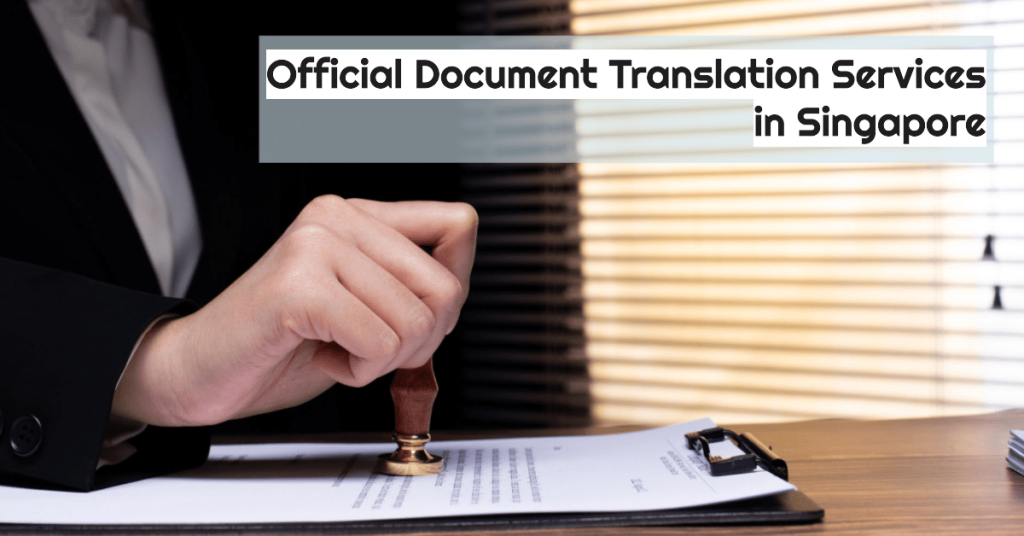Guide to Official Document Translation Services in Singapore
Imagine you’re applying for permanent residency in Singapore. The excitement of this new chapter can quickly turn into stress when you realise all your supporting documents – birth certificate, marriage certificate, academic transcripts – need to be officially translated. Or perhaps your company is expanding into a new market, requiring all your legal contracts and marketing materials to be accurately translated into the local language. These situations highlight a common challenge: the need for reliable, accurate translation of official documents.
Translating official documents isn’t as simple as using an online translation tool. Accuracy is paramount; a single mistranslated word can have serious consequences, from application rejections to legal disputes. Furthermore, many official bodies in Singapore, like the Immigration & Checkpoints Authority (ICA) or the Ministry of Manpower (MOM), have specific requirements for translated documents. They often require certification or notarisation by qualified translators to ensure legal validity. Navigating these complexities can be overwhelming, especially when you’re already dealing with tight deadlines and sensitive information.
This is where professional official document translation services come in. They provide the expertise and assurance you need, ensuring your documents are accurately translated, legally compliant, and accepted by the relevant authorities. They handle the intricacies of language, cultural nuances, and specific formatting requirements, allowing you to focus on what matters most.
This article serves as a comprehensive guide to official document translation services in Singapore. We’ll cover everything from the types of documents that typically require translation to how to choose the right provider and navigate the entire translation process. By the end, you’ll be well-equipped to make informed decisions and ensure your official documents are handled with the utmost care and professionalism.
What are Official Documents?
Official documents are documents issued by recognised authorities, such as government bodies, educational institutions, legal entities, or other official organisations. These documents carry legal weight and are often required for official purposes, such as immigration applications, legal proceedings, academic admissions, or business transactions. When these documents are in a language other than the one required by the receiving authority, they need to be officially translated. This translation must be accurate, certified, or notarised (depending on the requirements) to be accepted as valid.
Here are some common examples of official documents that frequently require translation in Singapore:
- Personal Documents:
- Birth certificates
- Marriage certificates
- Death certificates
- Passports and identity cards (NRIC, FIN card)
- Driving licenses
- Adoption papers
- Divorce decrees
- Academic Documents:
- Diplomas and degrees
- Academic transcripts and mark sheets
- Educational certificates
- Letters of recommendation
- Legal Documents:
- Contracts and agreements
- Wills and testaments
- Court documents (e.g., judgments, summonses)
- Legal affidavits and declarations
- Incorporation documents
- Immigration & Government Documents:
- Immigration applications (ICA documents)
- Employment passes and work permits (MOM documents)
- Citizenship applications
- PR applications
- Tax documents
- Medical Documents:
- Medical reports and records
- Hospital discharge summaries
- Vaccination records
- Business Documents:
- Company registration documents
- Financial statements
- Business proposals
- Marketing materials
This list is not exhaustive, but it gives you a good overview of the types of documents that often require official translation. It’s important to always check with the specific authority or organisation you’re submitting the documents to confirm their translation requirements.
Why Professional Official Document Translation is Crucial?
When it comes to official documents, accuracy isn’t just a preference; it’s a necessity. A poorly translated birth certificate can lead to delays in immigration processing. A mistranslated clause in a legal contract can result in costly legal battles. The stakes are high, and that’s why professional official document translation is absolutely crucial.
Here’s a breakdown of why professional official document translation is important:
- Accuracy: Avoiding Costly Errors: Professional translators possess a deep understanding of both the source and target languages, including their nuances, idioms, and cultural contexts. They go beyond simply converting words; they ensure the meaning is accurately conveyed, preventing misinterpretations that can have serious repercussions. Imagine a medical report with a mistranslated dosage instruction – the consequences could be life-threatening. Professional translation eliminates these risks.
- Legal Validity: Meeting Official Requirements: Many government agencies and legal bodies in Singapore require translated documents to be certified or notarised by qualified translators. This certification serves as a guarantee of the translation’s accuracy and authenticity, ensuring its legal validity. Professional translation services are familiar with these specific requirements and can provide the necessary certifications, saving you time and hassle.
- Compliance: Adhering to Specific Guidelines: Different organisations and government bodies have their own specific translation guidelines. For instance, the ICA may have particular formatting requirements for translated immigration documents, while the courts may have specific rules regarding the language used in legal translations. Professional translation services are well-versed in these diverse guidelines and ensure your documents comply with all applicable regulations.
- Confidentiality: Protecting Sensitive Information: Official documents often contain sensitive personal or business information. Professional translation services understand the importance of confidentiality and employ strict data protection measures. They often sign non-disclosure agreements (NDAs) and use secure file transfer systems to safeguard your information.
- Time Efficiency: Saving Time and Effort: Translating official documents is a time-consuming and meticulous process. Attempting to do it yourself or relying on unqualified individuals can lead to errors, delays, and ultimately, more expense. Professional translation services streamline the process, leveraging their expertise and technology to deliver accurate translations quickly and efficiently, freeing up your time and resources. They handle the entire process, from translation and review to certification and notarisation, allowing you to focus on other important matters.
Choosing the Right Official Document Translation Service Agency in Singapore
Selecting the right official document translation service is a critical decision. Your documents’ accuracy, legal validity, and acceptance depend on it. Here are the key factors to consider when making your choice:
- Accreditation and Certification: The most important factor is the qualifications of the translators. Look for a translation service that employs certified translators. In Singapore, translators certified by the Singapore Translators Association (STA) are generally recognised and trusted by official bodies. Verify the credentials of the translators and the agency’s affiliations.
- Experience and Specialization: Different official documents require different expertise. A translator specialising in medical terminology will be better suited for translating medical records than a general translator. Consider the translation service’s experience in handling the specific type of document you need translated (legal, medical, technical, etc.). A provider with experience in your industry or document type will have a deeper understanding of the subject matter and terminology.
- Reputation and Reviews: Do your research. Check online reviews, testimonials, and ratings of translation agencies. Look for feedback from previous clients, especially those who have had similar documents translated. A reputable translation service will have a track record of delivering high-quality translations and excellent customer service.
- Turnaround Time: Official document translations are often time-sensitive. Discuss your required turnaround time with the translation service upfront. Ensure they can meet your deadlines without compromising quality. Get a clear timeline in writing.
- Customer Service: Good communication is essential. Choose a translation service that is responsive, helpful, and readily available to answer your questions. They should be able to guide you through the process and address any concerns you may have.
- Pricing Transparency: Get a clear and detailed quote upfront. Understand the pricing structure (per word, per page, flat fee) and what is included in the price (translation, review, certification, notarisation). Be wary of unusually low prices, as they may indicate lower quality. A transparent pricing policy is a sign of a professional and reliable service.
- Data Security and Confidentiality: Ensure the translation service has robust data security measures in place to protect your sensitive information. They should have clear confidentiality policies and be willing to sign non-disclosure agreements (NDAs). Ask about their data storage and transfer protocols.
By carefully considering these factors, you can choose an official document translation service in Singapore that meets your specific needs and provides you with accurate, reliable, and legally valid translations.
Official Document Translation Process (Step-by-Step)
Understanding the official document translation process can help you prepare and ensure a smooth experience. Here’s a typical step-by-step overview:
- Initial Consultation: The process usually begins with you contacting the translation service. You’ll typically provide information about your document, including the type of document, the source and target languages, and your desired turnaround time. Some agencies may have online forms for you to submit your documents securely.
- Quotation and Agreement: Based on your document and requirements, the translation service will provide you with a detailed quote outlining the cost and estimated completion time. Once you agree to the quote, a formal agreement or contract may be signed, outlining the terms and conditions of the service.
- Document Submission: You will then submit your official document to the translation service. This is usually done electronically (e.g., via email or a secure file transfer platform) or, in some cases, physically. Ensure you provide clear and legible copies of your documents.
- Translation and Review: The translation service will assign your document to a qualified translator specialising in the relevant subject matter. The translator will then translate the document, paying close attention to accuracy, cultural nuances, and terminology. After the initial translation, the document typically goes through a rigorous review process, which may involve a second translator or editor checking for errors and ensuring quality.
- Feedback and Revisions (if necessary): After the translation is done, the agency will let the end user to review the translation document. If you find any issues with the translated document, communicate them to the translation service. Most reputable agencies will be happy to address your concerns and make any necessary revisions.
- Certification/Notarisation (if required): If your document requires certification or notarisation, the translation service will handle this step. A certified translator will attest to the accuracy of the translation, and a notary public will verify the translator’s identity. The specific requirements for certification and notarisation vary depending on the receiving authority.
- Delivery: Once the translation, review, and certification/notarisation (if applicable) are complete, the translation service will deliver the translated document to you. This is typically done electronically (e.g., via email) and as a hard copy. Ensure you receive the translated document in the format you require.
This step-by-step process ensures a structured and efficient approach to official document translation, minimizing the risk of errors and ensuring that you receive a high-quality, legally valid translation.
Official Document Translation Services Agency in Singapore
Navigating the complexities of official document translation in Singapore can be challenging, but it doesn’t have to be overwhelming. By understanding the importance of accuracy, legal validity, and compliance, you can make informed decisions and ensure your documents are handled with the utmost care. Choosing the right translation service is paramount. Look for certified translators, specialized experience, a strong reputation, and transparent pricing. Remember to plan ahead, provide clear instructions, and don’t hesitate to ask questions.
We hope this guide has provided you with valuable insights into the world of official document translation services in Singapore. Whether you’re dealing with immigration papers, legal contracts, or academic transcripts, the right translation partner can make all the difference.
Need reliable and accurate translation services for your official documents? WhizWordz specialises in providing certified and notarised translations for a wide range of official documents in Singapore. Our team of experienced and qualified translators is dedicated to ensuring your documents are accepted by all relevant authorities. Contact us today for a free consultation and quote. Let us take the stress out of document translation, so you can focus on what matters most. Visit our website at whizwordz.com.sg or call us at +65 6600 3798 so as to learn more on our official document translation.
Frequently Asked Questions (FAQs)
Q1: What is the difference between a certified translation and a notarised translation?
A certified translation is a translation that is accompanied by a signed statement from the translator attesting to its accuracy. A notarised translation, on the other hand, involves a notary public verifying the certified true copy of the translated document. Notarisation adds an extra layer of legal validity. Some authorities may require both certification and notarisation.
Q2: How do I know if a translation service agency is reliable?
Check online reviews and testimonials from previous clients. A reputable translation service will also have a clear pricing policy, good communication, and a willingness to answer your questions.
Q3: How much does official document translation cost in Singapore?
The cost varies depending on several factors, including the document type, language pair, complexity, length, and turnaround time. It’s best to get a customised quote from several translation agencies to compare prices.
Q4: How long does it take to translate official documents?
The turnaround time depends on the length and complexity of the document, as well as the translation service’s workload. Simple documents may be translated within a few days, while more complex documents may take longer. Discuss your required turnaround time with the translation service.
Q5: What types of documents require official translation in Singapore?
Many official documents require translation, including birth certificates, marriage certificates, academic transcripts, passports, legal contracts, immigration documents, and medical records. Check with the specific authority or organisation you are submitting the documents to confirm their translation requirements.




